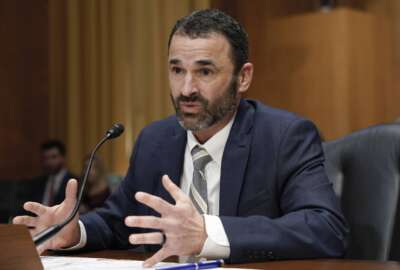Hubbard Radio Washington DC, LLC. All rights reserved. This website is not intended for users located within the European Economic Area.
On Air: Federal News Network
Trending:
IRS workforce development plan lacks one crucial element
The IRS has taken several big steps recently on the personnel front. It has brought in people to help improve taxpayer service. And just the other day commissio...
The IRS has taken several big steps recently on the personnel front. It has brought in people to help improve taxpayer service. And just the other day commissioner, Danny Werfel said he would reorganize management to emphasize service, compliance, technology and operations. But to discuss one missing element, the Federal Drive with Tom Temin talked with long-time leadership professor Bob Tobias.
Interview Transcript:
Tom Temin And Bob, let’s review some of the things on that people front. First of all, that you have pointed out that are pretty positive.
Bob Tobias Yes, Tom, incredibly positive. Recently, IRS Commissioner Danny Werfel testified at a congressional hearing that the IRS massive hiring effort of 5000 employees increased the IRS ability to answer taxpayer questions from 15%. Imagine that 15% in 2022 to 87% in 2023. So the IRS achieved the highest level of service to taxpayers in a decade. And it was just an extraordinary effort with extraordinary results. However, you know, there’s always a however, at the same time, the Government Accountability Office pointed out in a report that the IRS has a 16% turnover rate among its critical workforce processing tax returns. Now, the explanation that the IRS provided was that it put its strategic workforce plan on hold in 2019 because it didn’t have enough funding to do the work. Therefore, it couldn’t address the turnover question because it needed to determine what critical mission activities it had on board, where skills gaps existed and what skill gaps will be needed in the future. But I think that’s all misplaced. I believe turnover will not decline even if the IRS closes its information gap and provides skill gap training as they promised to do.
Tom Temin Right. There’s a basic difference there because you can have great plans and you know what your workforce needs will be and then therefore you can direct your hiring in saying we need 5000 people to do this, 2000 people to do that. Let’s train them to do all of that. But that doesn’t necessarily create the conditions that people, once you have them hired and trained, want to stick around?
Bob Tobias That’s right. That’s right on the mark Tom because employees don’t leave a new job. Employees leave a job because they don’t feel connected to the workplace, community and community creation. Community creation is a function of effective leadership. There was no discussion of the need for leadership development at the congressional hearing. So leaders need to be trained on how to connect with those they lead to create a supportive workplace community, especially with so many IRS employees who work several days a week at home.
Tom Temin I mean, isn’t that been one of the major ongoing critiques of the way the government does personnel over the decades is you have this senior executive service, but often people moving up to it really don’t get the essential training they need on that personnel management front. They somehow get promoted, but they don’t have the leadership training. I mean, this has come up before.
Bob Tobias That’s correct. They don’t get the leadership development training so that they can do effective leadership work. So relationship creation is a leadership skill that can be learned, but an agency needs to recognize, it needs to be taught and it needs to be evaluated just like any other skill. So ensuring the acquisition of leadership development skills is critical, but it’s not enough. It’s only the critical first step because the IRS has to ensure that what is taught is actually used and used effectively in the workplace.
Tom Temin We are speaking with Bob Tobias. He’s retired professor at the Key Executive Leadership Program at American University, also a retired federal union president. And I want to get back to one point you mentioned, too, and that is leadership training is particularly required in the age when people are teleworking. And that has got to add a really difficult inducing element when people are not physically together, can’t see one another, don’t interact informally much, if at all. How you build cohesiveness and team belonging in a situation like that.
Bob Tobias Well, Tom, it is difficult, but it’s difficult primarily because when I have people who are working at home, I have to change the way I relate to them. I can no longer count on automatically bumping into them. I cannot automatically count on them coming into my office. So I have to create a different environment where I. I’m constantly talking to them, making appointments to talk to them, as opposed to hoping I will bump into them in the workplace. So I have to take on a responsibility that I didn’t have to take on before. I have to change my behavior in this new world. And so it is challenging, it is different, but I assure you it can be done. But even if I if I’m doing all of that, I have to have the time to do leadership work as part of my work day. In a historically short staffed environment where you have high leader to lead ratios, leaders become doers of work with no time to do leadership work. So when the work piles up, leaders pitch in, they do their work. So the leader might just be limited to assigning work and doing work rather than spending time on leader work.
Tom Temin Right. That’s a good point. And I think, you know this the industrial age we’re in seems to, I don’t know, denigrate those things. I mean, we also got rid of support staff. People make fun of, you know, secretaries or administrative assistants, which to me were incredibly valuable people with a great deal of skill that really enabled the rest of the organization to do what it had to do. But those have been wiped out in a lot of areas. There’s many fewer of that type of person. By the same token, that idea of middle management leadership has been, I don’t know, maybe denigrated on the altar of productivity.
Bob Tobias We assume, and I think often erroneously, Tom, that everything can be done on my computer. You know.
Tom Temin It’s turned us all into secretaries.
Bob Tobias And anybody who travels and tries to make airline reservations and who is old enough to remember when you had when you called a company and they did it all and you just breathed a sigh of relief. Now that access to a computer only increases the anxiety and amount of work you do.
Tom Temin All right. So getting back to the leadership training question then, what’s your thought that the IRS ought to be doing here or any large organization that’s trying to effectuate reform and change improvement?
Bob Tobias Well, it seems to me, Tom, that this issue of developing leaders is not just an IRS problem, it’s a government wide problem. Research project after research project has shown that the greatest reason for federal employee leadership failure is promoted leaders continue to do what they’ve done in the past in their new leadership role. They don’t do leadership work. All of which means that leaders at every level, beyond the first level have to hold the leaders they lead responsible for leader work or evaluating leader work. Giving feedback about leader work. Leaders who are not effective as leaders should be put in non leader roles where their expertise can be used rather than failing as a leader and poisoning an entire group who then chooses to leave the IRS or any other government agency because they experience a non supportive community environment.
Tom Temin Yeah, I heard a great expression from a retired military officer who nearly failed in his first attempt at being an officer or an executive in business. After leaving the military, the processes were totally different. The expectations of leadership were totally different, and his expression was, What got you here? Won’t get you there.
Bob Tobias That’s exactly right. You know, as a person who wants to be a leader, I have to give up maybe the technical expertise that got me here in favor of learning what I need to get me there. And that has to be provided by government agencies. And once they provide that development, they have to give them time in the day to actually be a leader and then they have to be evaluated about their work.
Copyright © 2024 Federal News Network. All rights reserved. This website is not intended for users located within the European Economic Area.
Tom Temin
Tom Temin is host of the Federal Drive and has been providing insight on federal technology and management issues for more than 30 years.
Follow @tteminWFED





